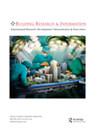影响尼日利亚建筑中小企业采用循环经济原则的决定因素评估
IF 3.7
3区 工程技术
Q1 CONSTRUCTION & BUILDING TECHNOLOGY
引用次数: 6
摘要
摘要最近发生的包括新冠肺炎疫情在内的全球事件进一步引发了建筑组织和政策制定者的担忧,他们需要重新思考资源利用问题,尤其是在大多数国家逐渐恢复正常的情况下。因此,本研究的主要目的是评估当前发展中国家建筑业中小企业实施循环经济概念的障碍和驱动因素。焦点小组被用来回答关于影响建筑中小企业CE实施的决定因素的总体问题。焦点小组展示了丰富的CE实践详细信息和对新兴CE研究主题的见解。研究发现,CE概念为在运营活动中,特别是在建筑环境中,通过重复使用、修复和回收受限资源,实现经济价值提供了有力的论据。此外,这项研究的发现为研究界和从业者提供了一个基础,让他们认识到如何将各种决定因素结合起来,影响CE的采用,并可能产生可持续的组织价值产出。本文章由计算机程序翻译,如有差异,请以英文原文为准。
An evaluation of determinants influencing the adoption of circular economy principles in Nigerian construction SMEs
ABSTRACT Recent global-wide events including the COVID-19 pandemic have triggered further concerns for construction organizations and policy makers to rethink their resource utilization particularly as most nations gradually return to normalcy. Thus, the primary aim of this study was to appraise the current barriers and drivers of circular economy (CE) concept implementation among construction small and medium-sized enterprises (SMEs) in developing countries. Focus groups were used to answer the overarching question on the determinants influencing CE implementation within construction SMEs. The focus groups revealed a wealth of CE practice detailed information and insights into emerging CE research themes. The study found that the CE concept makes strong arguments for achieving value in economies by reusing, repairing and recycling of constrained resources during operational activities especially within the built environment. Moreover, the findings of this study provide a basis for the research community and practitioners to recognize how various determinants can be coalesced to influence CE adoption and to potentially yield sustainably organizationally valued outputs.
求助全文
通过发布文献求助,成功后即可免费获取论文全文。
去求助
来源期刊

Building Research and Information
工程技术-结构与建筑技术
CiteScore
8.60
自引率
7.70%
发文量
43
审稿时长
>12 weeks
期刊介绍:
BUILDING RESEARCH & INFORMATION (BRI) is a leading international refereed journal focussed on buildings and their supporting systems. Unique to BRI is a focus on a holistic, transdisciplinary approach to buildings and the complexity of issues involving the built environment with other systems over the course of their life: planning, briefing, design, construction, occupation and use, property exchange and evaluation, maintenance, alteration and end of life. Published articles provide conceptual and evidence-based approaches which reflect the complexity and linkages between cultural, environmental, economic, social, organisational, quality of life, health, well-being, design and engineering of the built environment.
 求助内容:
求助内容: 应助结果提醒方式:
应助结果提醒方式:


